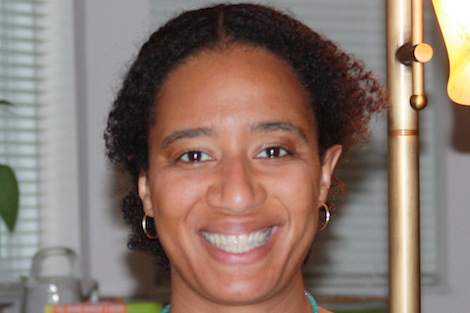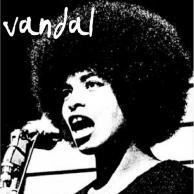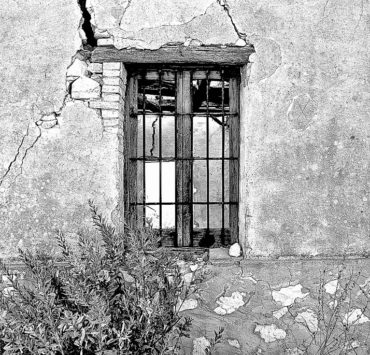
Read Myriam J. A. Chancy’s “The Aftermath”
1. What about your work (creative, activist, etc) excites you the most?
What makes me most enthusiastic about my work, as a scholar/activist, writer/artist, is the knowledge that finding ways to creatively channel my thoughts, observations and research in forms digestible for multiple audiences might make a transformative difference both in the lives of those who come across my work and for those who are the subject of my work; my purpose is always transformation. I may not know who, what or where my work reaches but I always hope that it makes invisible threads of connection that will lead to changes in perception, engagement or understanding.
2. Can you share with us some artists/ writers that are currently impacting the way you think and live? That inspire/motivate you and you feel are significant?
Personally, I always find that the people who make the most impact on me are those that whose work will never be in a museum or written up in a curator’s notes: craftspeople, market women, cultural activists without degrees and university affiliations. I’m also thankful for the opportunities to have served as an expert advisor for various foundations, such as the Prince Claus Fund, through which I learn of amazing cultural workers globally; recently, I was invited to and attended their 2012 Awards ceremony and learned about “Eloisa Cartonera,” an Argentinian grassroots book-making cooperative that uses discarded cardboard to make affordable hand-made editions of local writers, known and unknown, so that poor people could have access to books. They won they principle Prince Claus Award and I’m sure I would never have heard of them otherwise. I like to keep up with what’s going on internationally at the grassroots level. I think that’s where the real innovations and breakthroughs are going on; and the fact that most innovations are taking place without much resources is a source of inspiration and motivation.
3. Any hot button issues that you feel Vandal should address in the future? Or any silences in public discussions or even private spheres that should come out in the open?
I think increasing class divides in and among communities of color and in developing countries is a silence in creative and critical discussions that needs to take place. For instance, it’s become clearer and clearer to me that writers and scholars increasingly speak for a group even as they themselves have achieved untold privileges, without every reflecting on that privilege, i.e., speaking as if they are still part of the marginalized while experiencing none or very little of the marginalization, thereby silencing the very real inequities being experienced today in the communities they write about, while speaking out of a ready-made identity or overdetermined notion of what that community’s challenges might be. The lack of attention to class as a category of investigation is part of the problem; the lack of admission that you can be a member of a marginalized community and have acquired class mobility and privilege is a reality that can turn into a means of silencing those who have not had those opportunities while standing in their place rather than making use of privilege to bring more people, and their stories, to the table.
4. In this world full of strife and discord, do you have any suggestions big or small that can make this world a better place?
Pay attention to details, to the ways in which others are struggling in their own lives; learn from those surviving in dignity so that you can assist others in living with dignity and less strife. Empathy is a lost art; cultivating it might yield collaborations for hope.
5. Do you have any special rituals, or is writing something you just have to hunker down and do?
It depends on the kind of writing I’m doing; creative writing takes inspiration from another dimension and then I just follow the pull; I also tend to write creatively to music. Academic writing, for me, is more of a response to political moments that I feel need to be addressed so there, I feel a sense of urgency, that sometimes moves me out of the creative writing, but which is just as purposeful. I don’t have any rituals others than when I am full engaged, I have a tendency to write very early (between 4-7 am), with a cup of whisked matcha, or very late. No other rituals.
6. When did you decide to be a writer?
Writing chose me. I’ve been writing since childhood, since the age of about seven. Because of that continuity, I didn’t consider myself a writer probably until I had several books out and when my first novel garnered a shortlisting for a Commonwealth Prize, on a long list that included Canadian author Margaret Atwood. Then, I started taking myself a little more seriously.
7. Who were and are some of the writers important to you?
Like in everything, I am very eclectic; I read widely and broadly. Since I moved from the Francophone to Anglophone worlds as a child, I have cross-cultural and cross-linguistic influences. An early influence from children’s writing in French would have been La Comtesse de Ségur with her “Adventures of Sophie” books (a bit like the Anne of Green Gables series in Canada, also an early influence) but later, major influences would have been Raymond Carver, Margaret Atwood, James Baldwin, Toni Morrison. James Baldwin, on whom I wrote my Master’s thesis, is probably the mainstay in all of these.
8. Do you have a view on whether men and women write differently? Received differently?
I’ve come to believe that there isn’t an essential difference according to gender but an essential difference according to privilege regarding how or what writers write. Men seem to write differently simply because their social privileges give them a different sense of an horizon towards which they write, or, I should say that gender is an issue but I think it is also a class issue. As women and others from marginalized groups acquire or write out of privilege, I see a similarity across the board in the writing, of what the writer assumes he or she can write about and how they write about it. If you go back to Victorian writing, for instance, though there is an emergence of a feminist consciousness in themes, the writing style is very masculinist. I’m sure I could write a tome about this, but, in the end, and maybe this is just where my head is at today: it seems to me that class difference is really what we need to think about.
Now, in terms of reception, there is a marked difference in how men vs. women are received. It’s odd, really, since most women are readers, but, since most awards and editorial panels, as well as publishing houses are governed by men, there is a real disconnect between what writing is valued. The world of publishing is run a bit like a culinary institute – men are chefs while women are cooks. You can see this mentality replicated in MFA programs nationally and then refracted according to race and class, replicating the same chauvinisms of the society in literature and creative writing programs with white males at the top of the hierarchy and women of color, especially Black women, at the bottom – a lasting imperialism. There is also the curious cooptation by mainstream (read: male/white) writers of women’s and postcolonial themes, a recognition that writing from the margin is doing something important aesthetically without recognizing the authors themselves. Hopefully, one day the balance of things will change.
Myriam J. A. Chancy, Ph. D., is a Haitian born writer/scholar. Her first novel, Spirit of Haiti (Mango 2003), was a finalist in the Best First Book Category, Canada/Caribbean region, of the Commonwealth Prize 2004. She is also the author of Framing Silence: Revolutionary Novels by Haitian Women (Rutgers 1997), Searching for Safe Spaces : Afro-Caribbean Women Writers in Exile (Temple 1997; Choice OAB Award, 1998), a second novel, The Scorpion’s Claw (Peepal Tree Press 2005) and The Loneliness of Angels (Peepal Tree Press 2010), shortlisted in the fiction category of the Bocas Prize for Caribbean Literature 2011. She currently sits on the editorial advisory board of PMLA and is Professor of English at the University of Cincinnati.








